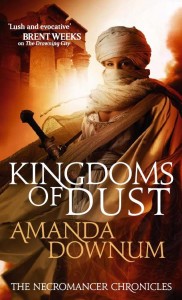Cover Launch: KINGDOMS OF DUST by Amanda Downum
 Behold the new artwork for the upcoming Kingdoms of Dust – Amanda Downum’s rich and exotic fantasy adventure featuring necromancer-spy Isyllt Iskaldur.
Behold the new artwork for the upcoming Kingdoms of Dust – Amanda Downum’s rich and exotic fantasy adventure featuring necromancer-spy Isyllt Iskaldur.
Larry Rostant has done us proud yet again with his luxurious imagery, which we feel perfectly suits Amanda’s lush and atmospheric writing style. And the visual sums up the epic setting for this book: think fiery red deserts, swirling sandstorms and ruined cities . . .
It’s the perfect addition to the gorgeous artwork for the rest of the Necromancer Chronicles series (see all the covers together below). And the joy is that, since these books can be read as stand-alones, you can pick up whichever book most appeals to you first . . . A difficult choice indeed! Larry Rostant: we truly heart you. And tons of thanks must also go to our very talented UK designer Peter Cotton, who put all of these covers together. (more…)


 One in particular caught my eye. It had a man in a spacesuit on the cover which, as a child fascinated by the Apollo missions, was a big draw. And that was pretty much it for the next thirty-odd years. That book (and I’ve finally tracked it down – the 1976 Puffin edition of Spaceship Medic, by Harry Harrison) quite literally changed my life. Soon I was on the hard stuff: Clarke, Asimov, the Heinlein juveniles. Anderson. Pohl. Herbert. Aldiss. Anything with a spaceship on the front, and these were the days when Bob Foss was king – those spaceships were huge.
One in particular caught my eye. It had a man in a spacesuit on the cover which, as a child fascinated by the Apollo missions, was a big draw. And that was pretty much it for the next thirty-odd years. That book (and I’ve finally tracked it down – the 1976 Puffin edition of Spaceship Medic, by Harry Harrison) quite literally changed my life. Soon I was on the hard stuff: Clarke, Asimov, the Heinlein juveniles. Anderson. Pohl. Herbert. Aldiss. Anything with a spaceship on the front, and these were the days when Bob Foss was king – those spaceships were huge. When you write a book, you’re only ever showing the important bits. Seems obvious, right? The boring stuff, the stuff that isn’t intimately bound in the narrative, the stuff that doesn’t just leap off the page, or drive home some essential truth about your characters or the world they live in, you leave out*. But it’s still there, in a way.
When you write a book, you’re only ever showing the important bits. Seems obvious, right? The boring stuff, the stuff that isn’t intimately bound in the narrative, the stuff that doesn’t just leap off the page, or drive home some essential truth about your characters or the world they live in, you leave out*. But it’s still there, in a way.
 Starting this April, Orbit will be publishing brand-new original short fiction written by our authors as eBooks. The stories will be available at all major eBook retailers – initially in the US, further afield in the very near future.
Starting this April, Orbit will be publishing brand-new original short fiction written by our authors as eBooks. The stories will be available at all major eBook retailers – initially in the US, further afield in the very near future.
 This week Jack Womack chats with Jesse Bullington about his latest novel, THE ENTERPRISE OF DEATH. Subjects covered include myth and the medieval mind, folklore and superstition, secret histories, and the use of shock value, swears, and violence in art.
This week Jack Womack chats with Jesse Bullington about his latest novel, THE ENTERPRISE OF DEATH. Subjects covered include myth and the medieval mind, folklore and superstition, secret histories, and the use of shock value, swears, and violence in art. I recently came across the original cover letter from Lili’s agent in 2004. That’s when I still had @twbg as part of my email!! I remember looking at this letter — on letterhead, back before all manuscripts were emailed – and putting a note on it for my Editorial Director at the time. I remember I drew little stars on it (What? I was an Assistant Editor! I thought that’s what you did when you wanted to buy something!) and I wrote something to the effect of “I love this. Give it to me!” Hm. Perhaps not in those exact words… but that was the gist.
I recently came across the original cover letter from Lili’s agent in 2004. That’s when I still had @twbg as part of my email!! I remember looking at this letter — on letterhead, back before all manuscripts were emailed – and putting a note on it for my Editorial Director at the time. I remember I drew little stars on it (What? I was an Assistant Editor! I thought that’s what you did when you wanted to buy something!) and I wrote something to the effect of “I love this. Give it to me!” Hm. Perhaps not in those exact words… but that was the gist.